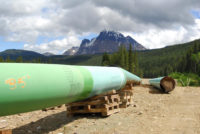Federal Suit Details Claimed Fraud in Failed $7.5B Clean Coal Project

Seen here under construction in 2013, the Kemper power plant coal-gasification unit project was cancelled in 2018 and then demolished.
Photo Credit: slightly cropped, XTUV0010 under CC By-SA 4.0 via Wikimedia Commons.
A former construction manager at the now defunct $7.5-billion Kemper clean coal and carbon capture project in Mississippi claims in a just- unsealed federal whistleblower lawsuit that utility Southern Co. and unit Mississippi Power Co. defrauded the U.S. Energy Dept. of $382 million by filing false statements about the cost, construction status and commercial viability of the project, cancelled in 2018.
The companies intentionally concealed cost overruns and delays at the site to “induce DOE to disburse the money,” says the amended complaint filed Oct. 30 by Kelli Williams, a former Southern site manager who resigned in 2016.
Southern, which has not yet reached the 21-day deadline to file a suit response, did not comment.
The complaint was initially filed in 2018 in the Atlanta federal district court but was put under court seal to allow the government to investigate the claim as required by the False Claims Act. The U.S. Justice Dept. requested it be unsealed but declined to join the case as a plaintiff, with reasons not specified.
Williams can continue the action “in the name of the U.S.,” the suit states, with Justice required to approve any dismissal or settlement.
What Happened?
The Kemper County, Miss., plant was intended to gasify lignite coal to burn as syngas in a 562-MW power plant, with 50% of carbon emissions to be sequestered underground. The facility was considered a successful example of carbon capture technology for power plants—intended to turn lignite coal into lower-carbon gas that would be burned to generate power, with captured greenhouse gases used in enhanced oil recovery at nearby mature oil fields.
It was estimated as a $2.2-billion project when construction began in 2010, with completion set for 2014.
While DOE’s initial $245 million in funding was provided throughout 2010 and 2011, project owners concealed cost overruns and delays already plaguing the facility, the complaint says. Southern abandoned the project in 2017 and demolished the gasifiers and related equipment in 2021, with the plant's power-generating turbines operating since on natural gas.
According to Williams’ complaint, the companies created false estimates to conceal true ballooning costs to mislead DOE, which would have halted financial support. She began working for Southern in 2006 and was construction site manager from 2010 to 2013. In that role, she had first-hand knowledge about company “schemes and frauds,” and raised objections about the false budget information, the complaint says.
Williams also claims in the filing that the company retaliated against her through evaluations and apparent demotions, saying that she was not a "team player."
State regulators "would have rescinded" project approval or never have issued it, if they knew of the persistent delays, Williams contends, adding that she was asked on numerous occasions to prepare documents for the regulators showing the troubled project was on track.
Attorneys for Williams did not respond to ENR queries related to her current employment status.
Technology Promise
In the project’s original application to DOE, its purpose was stated as a “demonstration of an air-blown integrated gasification combined-cycle power plant based on a transport gasifier.” The gasifier was to be based on catalytic cracking technology provided by Kellogg Brown & Root, now KBR. It was presented as a simpler and more robust method to generate power from coal with high moisture or high ash content compared to other alternatives.
A joint venture between KBR and Yates Construction Co. was replaced on the Kemper project in 2012, ENR reported at the time, with the owner stating it sought to rein in project costs and "change its execution strategy."
It named Baton Rouge, La.-based Performance Contracting as lead contractor as the project ramped up to its busiest phase—claiming the project was on schedule, with commercial operation set to begin in mid-2014. KBR continued to perform engineering and start-up services for the project, the firm and Southern said. Yates Construction said it was "not the cause for any of the previous cost overruns" that were disclosed.
An internal cost re-estimate in April 2012 predicted Kemper would cost 38% above the original estimate. “Management had known for months that 50% more steel, 100% more pipe and 400% more electrical cable would be needed to complete the gasifier,” the complaint says. The increased materials were tied to added labor costs.
Overruns and delays should have triggered reports to DOE that the company never filed, Williams' suit contends.
The defendants also hid the true cost and timeline by pushing construction ahead even without needed materials, despite the likelihood of work having to be redone, the complaint says. “While lacking appropriate materials to secure piping, defendants used temporary lashing, which meant lashings would have to be replaced down the road at much greater [labor and materials] cost,” it says, also noting higher costs tied to more difficult pipe fabrication done after the rest of the structure was built.
Southern and Mississippi Power must pay triple damages, more than $1.1 billion, if Williams wins the lawsuit. She would be entitled to 15% to 30% of the damage award.
A former engineer working for Southern also raised similar project misrepresentations to company officials and to government officials, according to a Mississippi public media report in 2021. But the report indicates no enforcement actions arising from the allegations and settlement details were not disclosed.






